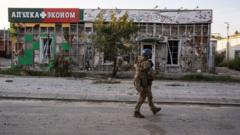Lebanon's political landscape is shifting dramatically as Hezbollah, once an uncontested power, grapples with setbacks from its ongoing conflict with Israel and evolving regional dynamics. The militant group's influence is waning as political blockages are surmounted, signaling a new chapter for the country.
Hezbollah's Declining Grip Sparks New Political Era in Lebanon

Hezbollah's Declining Grip Sparks New Political Era in Lebanon
As Hezbollah faces unprecedented challenges from war and regional shifts, Lebanon enters a transformative phase.
Hezbollah, a formidable force in Lebanon for decades, has traditionally wielded considerable influence, controlling significant government sectors and military might surpassing that of the national army. However, recent conflicts, particularly a prolonged 14-month war against Israel, have severely weakened the group. Compounded by the fall of its primary ally, Syrian President Bashar al-Assad, and the diminishing authority of Iran—a key supporter—the balance of power in Lebanon is undergoing a significant realignment.
Political analysts indicate that Hezbollah, while still possessing thousands of loyal fighters, now finds itself on precarious ground. Mohanad Hage Ali from the Carnegie Middle East Center highlights that Hezbollah and Iran's once-firm grip on Lebanon is dissolving, ushering in a "new political reality."
The recent election of a new president by Lebanon's Parliament, after years of political stalemate attributed to Hezbollah's obstructionism, underscores a pivotal shift. This election breaks a protracted period of governance by a caretaker authority, invigorating prospects for enhanced stability and governance in a nation long hampered by crisis and paralysis.
As this transformation unfolds, analysts suggest the implications of Hezbollah's diminished clout and the reconfiguration of political allegiances will continue to reshape Lebanon's future. The region watches closely as these developments could redefine not just Lebanon's internal politics but also its relationship with neighboring countries and direct influences within the broader context of Middle Eastern geopolitics.
Political analysts indicate that Hezbollah, while still possessing thousands of loyal fighters, now finds itself on precarious ground. Mohanad Hage Ali from the Carnegie Middle East Center highlights that Hezbollah and Iran's once-firm grip on Lebanon is dissolving, ushering in a "new political reality."
The recent election of a new president by Lebanon's Parliament, after years of political stalemate attributed to Hezbollah's obstructionism, underscores a pivotal shift. This election breaks a protracted period of governance by a caretaker authority, invigorating prospects for enhanced stability and governance in a nation long hampered by crisis and paralysis.
As this transformation unfolds, analysts suggest the implications of Hezbollah's diminished clout and the reconfiguration of political allegiances will continue to reshape Lebanon's future. The region watches closely as these developments could redefine not just Lebanon's internal politics but also its relationship with neighboring countries and direct influences within the broader context of Middle Eastern geopolitics.




















